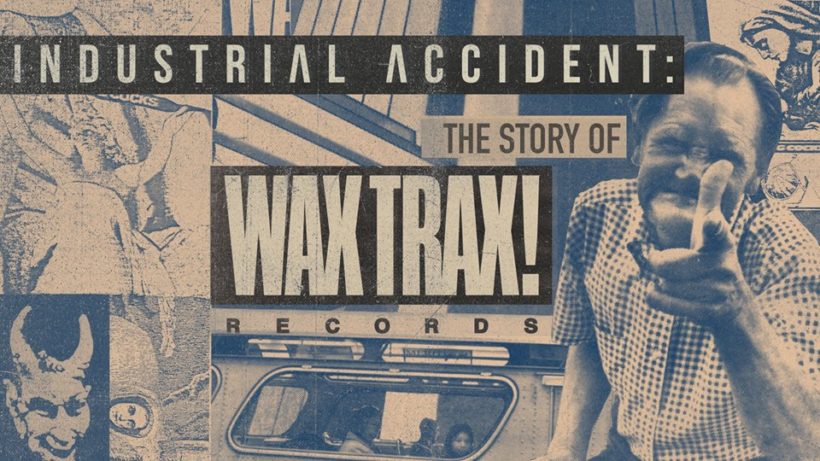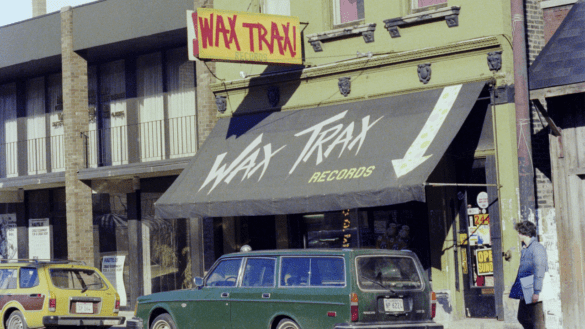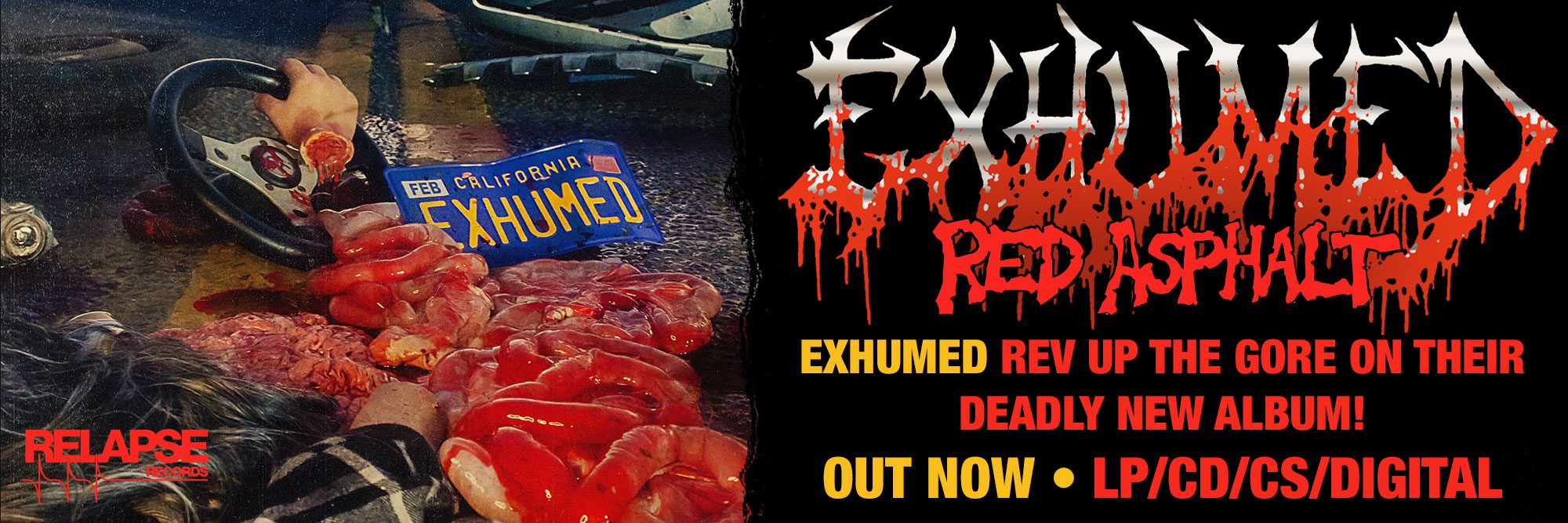
On the most recent Record Store Day, fans of industrial music (in general) and Wax Trax! Records (specifically) were able to purchase DVD/Blu-Ray copies of Industrial Accident: The Story of Wax Trax! Records, the documentary film of the pioneering label that has been making the festival rounds for about a year. Additionally, a ten-track soundtrack was also on offer featuring classic and rare tracks that helped establish Wax Trax! as the leading force in industrial music, including Decibel-friendly acts like Ministry, the Young Gods, Laibach and KMFDM. If, on RSD, you purchased the film and/or soundtrack from a select record stores in Chicago, New York, Austin, Toronto, Los Angeles and San Francisco, you were given free tickets to a screening of Industrial Accident, were able to sit in on a Q&A session with the director and guests and attend a show later that evening featuring Cold Cave and Ministry doing a Wax Trax!-era set. If you didn’t want to go that route, you could secure tickets on a first come-first serve basis via Ministry’s website/fanclub.

I didn’t know any of this when I ambled up to the Toronto stop of what was billed as ‘Industrial Accident: The Story of Wax Trax! Records Experience Events, Presented by Vans.’ From my perspective, all I knew was that I was on the media list and was here to cover the evening’s event. I quickly discovered I didn’t have to jump through the same hoops as most of the hundreds of people lining up on an early mid-week afternoon. There were a different set of hoops. But hey, “it’s all about the experience” I’ve been told and it must be noted that I quite enjoyed the fact that this particular experience included a neatly organized seating plan and cushioned chairs in order to rest my tired bones, aching feet and expansive arse while taking in the chronicled history of Wax Trax!.
Like most music-related documentaries, much of the comprehensive focus was on the origins and early years of the label with visuals providing revelations and accenting the anecdotes, story-telling and narrative. Director Julia Nash is the daughter of Wax Trax! co-founder Jim Nash and he, along with business and life partner, Dannie Flesher, were pack rats of the highest order. This was paid witness to in the opening scene where a treasure trove of photos, articles, documents, audio reels and endless detritus are being poured through in a barn on the Arkansas farm which Flesher retired to before his death in 2010 (Nash passed in 1995). Included were tonnes of rare photos and video footage grabbed from various sources of the original Wax Trax! Records store in Colorado. Interviews with family, friends, former employees and Jello Biafra (originally a Boulder, CO resident) about those early years painted a picture of not only what the music landscape was like in the early ‘70s, but also what it was life was like for the openly out and unashamed couple.

Industrial Accident is as much a story about the trajectory of Nash and Flesher’s lives as it is about Wax Trax!’s. It becomes very clear early in the film that a love of exposing people to music was one of their shared passions. This love was entwined in the existence of the record store in the first place, their 1978 move to Chicago and their less-than-air-tight business practices. It was a few years after uprooting to the Windy City that they fell into being the beacon for the burgeoning industrial scene as bands on this side of the pond struggled to find outlets for their music while they jumped on the opportunity to enter licensing partnerships with bands and labels from overseas where the scene was creating a buzz. The praise and reverence that members of KMFDM, Front 242 and Ministry exude for Wax Trax! taking a chance on them, distributing their releases, organizing tours and so on can be seen in the filmed interviews that are cleverly interspersed with footage from those early shows, tours and hang out sessions.
What’s striking is that you get the sense that Nash and Flesher never had a plan and just fell into releasing music from this scene because it sold boatloads and that the counter-cultural lifestyle, belief system and values of many of these bands fit well with the duo’s laissez-faire approach to spending and hardcore approach to partying. Either way, the doc does a good job not sugar coating the reasons for Wax Trax!’s collapse in the ‘90s, the analysis of the years in which TVT bought the label and how their unfocused flooding of the market essentially killed the whole thing off. There is a noticeable gap in the lack of mentioning the legendary and herculean amounts of drug use that went through the label and its bands and how that impacted thought processes and the bottom line. Also curious is how the film doesn’t at all address how Julia Nash herself revived the label in 2014, instead giving things a sense of finality with the Wax Trax! Retrospective shows in 2011.
A short Q&A session followed the film’s conclusion. Among the included were Ms. Nash, Jim Nash’s ex-wife, Revolting Cocks’ Chris Connelly and My Life With the Thrill Kill Kult’s Frankie Nardiello and it ended up being a chance for attendees to express their appreciation for the label and the film’s historical rendering. For those more deeply attached to Wax Trax!, the excitement was palpable in the questions and reverence lobbed at the panel and the lenience given to Nardiello’s space cadet responses and penchant for interrupting people with meandering commentary. On the other hand, one wonders about how much of Wax Trax! is dead set on living on past glories after Nash reveals they turned down the Young Gods after the Swiss trio approached the label about handling the North American release of their recently released album. This would have not only provided full-circle sentimentality (TYG’s 1987 debut album, Envoyé was release #WAX021) but also injected a bunch of cash into Wax Trax! coffers.
Once the questions were wrapped, the room was cleared for the live show portion of the evening. Cold Cave features former American Nightmare/Give up the Ghost vocalist Wes Eisold paying homage to Joy Division, Depeche Mode, New Order and the like. Having never released anything on Wax Trax!, their inclusion was a mystery to me, though I’m sure someone in a long, black trenchcoat and old timey aviator goggles could explain the connection. There’s a darker, heavier and more abrasive air to the band’s live sound, primarily provided by rock solid, metronomic and hypnotic drumming and the layers provided by a rotating wall of four keyboards, two guitars, bass and three vocalists. The way they weaved melody in and around soundscape washes anchored by up-tempo dancing hi-hat/kick drum patterns definitely compensated for the moaning lead vocals and overall sullen stage presence.

In all honesty, when I heard Ministry’s set at this “experience” was supposed to consist of Wax Trax!-era material, I was going to bail. If you hop in your homemade time machine, you’ll remember that Ministry’s early works and releases on the label were a bunch of rudimentary (read: not very good) electro-synth-pop. Uncle Al and his charges didn’t really hop on the heaviness bandwagon until 1988’s The Land of Rape and Honey and my not being a fan of that early material meant a planned early departure and time spent under the warmth of my new duvet. Coincidentally, I ran into an old friend who follows this scene far more closely than I and he assured me Ministry’s set list was going to cover the classics with RevCo. and 1000 Homo DJs numbers added in. The “Wax Trax!-era” tag wasn’t so much material Ministry released on the label as much as music they released while the label existed. In any event, their set unsheathed the hits: “The Missing,” “Jesus Built My Hot Rod,” “Stigmata,” “N.W.O.,” “Thieves,” Chris Connelly came out for a couple tunes and they even whipped out the 1000 Homo DJs cover of Sabbath’s “Supernaut.” The sound was pristine, the energy was on point with the guitar tandem of Cesar Soto and Sin Quirin aptly balancing the laying down grooves and shred heroics. Also, seeing John Bechdel (ex-Prong, Fear Factory, Killing Joke) stoically manning the keyboards, noise and samples brought me back to my own failed days of trying to figure out how to use and integrate keyboard samplers into the shitty music I was writing back in the early ’90s. All in all, Ministry didn’t disappoint neither die hards nor skeptics and the entire show came across more as a convivial gathering of old friends than an ordinary tour stop that fit the structure and content of the evening’s festivities. The “Experience” run of dates will have wrapped up two days before the time you read this, but if you come across Industrial Accident, it’s very worthy of your viewing time.






